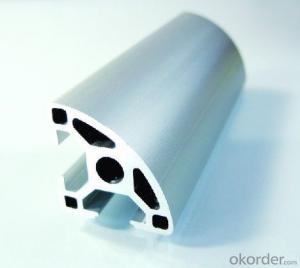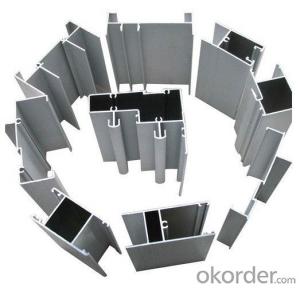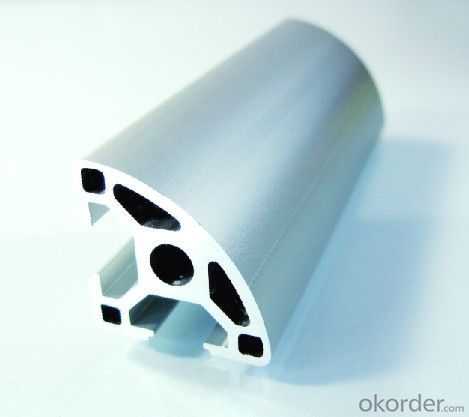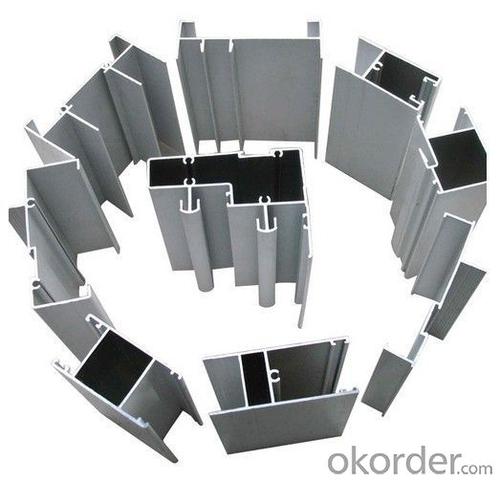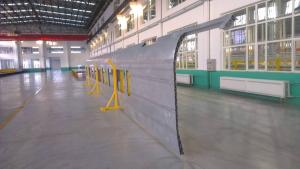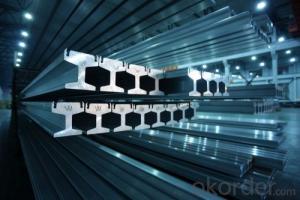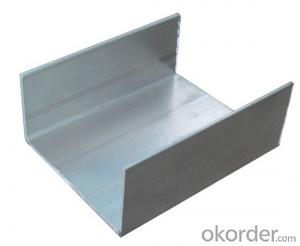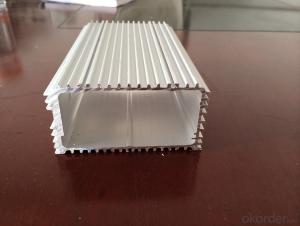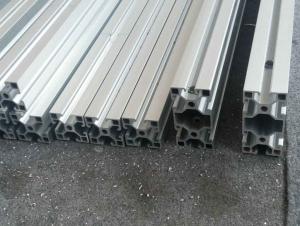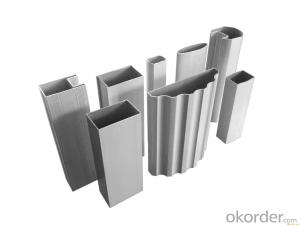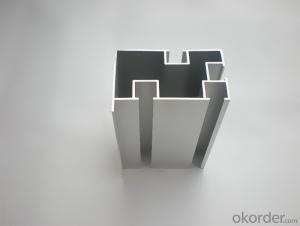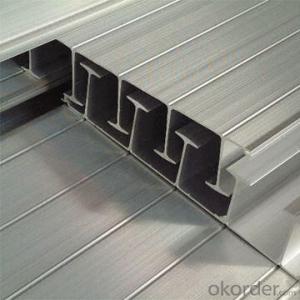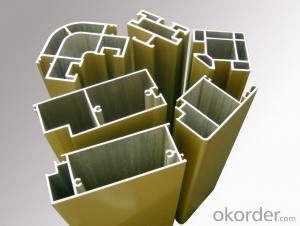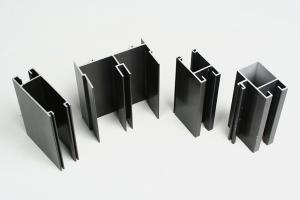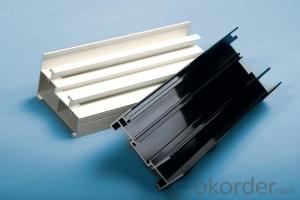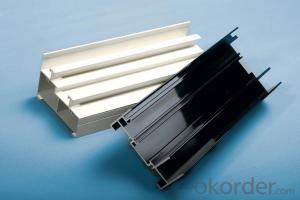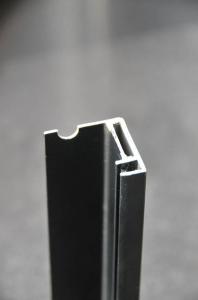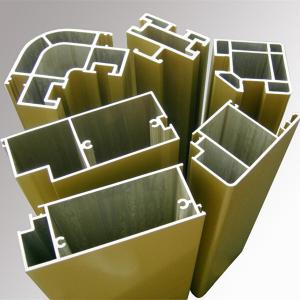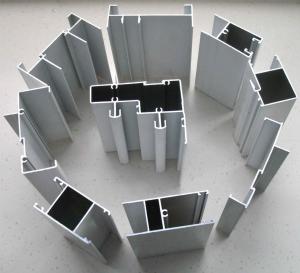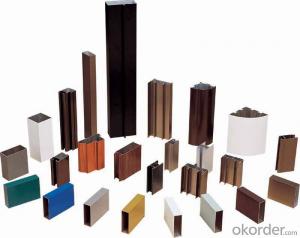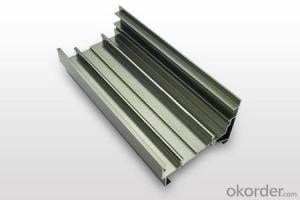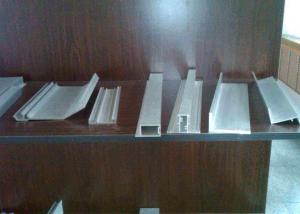80 20 Aluminum Extrusion Profiles Made in China Alloy 6 Series
- Loading Port:
- Shanghai
- Payment Terms:
- TT OR LC
- Min Order Qty:
- 1 m.t.
- Supply Capability:
- 1000 m.t./month
OKorder Service Pledge
OKorder Financial Service
You Might Also Like
Specification
1. Specification of Aluminum Profiles Made in China Alloy 6 Series
Alloy | State | Tensile Strength δbMpa | Non-proportional Stretching Stress(δp0.2Mpa) | Stretching rate (δ%) | Pattern Thickness (mm) | HV | HW |
No Less Than | |||||||
6061 | T4/T6 | 180/265 | 110/245 | 16/8 | - | - | - |
6063 | T5/T6 | 160/205 | 110/180 | 8/8 | 0.8/- | 58/- | 8/- |
6063A | T5/T6 | 200,190/230,220 | 160,150/190,180 | 5,5/5,4 | 0.8,0.8/-,- | 65,65/-,- | 10,10/-,- |
2. Application of Aluminum Profiles Made in China Alloy 6 Series
wall cladding, ceilings, bathrooms, kitchens and balconies, shutters, doors,windows…
3. Feature of Aluminum Profiles Made in China Alloy 6 Series
Surface Quality :
Be free from Oil Stain, Dent, Inclusion, Scratches, Stain, Oxide Decoration, Breaks, Corrosion, Roll Marks, Dirt Streaks and other defect which will interfere with use,
Mochenical Property:
Chemical Composite and Mechanical Property
4. Certificate:
SGS and ROHS(if client request, paid by client), MTC(plant provided), Certificate of Origin(FORM A, FORM E, CO), Bureau Veritas and SGS (if client request, paid by client), CIQS certificate
5. Image of Aluminum Profiles Made in China Alloy 6 Series
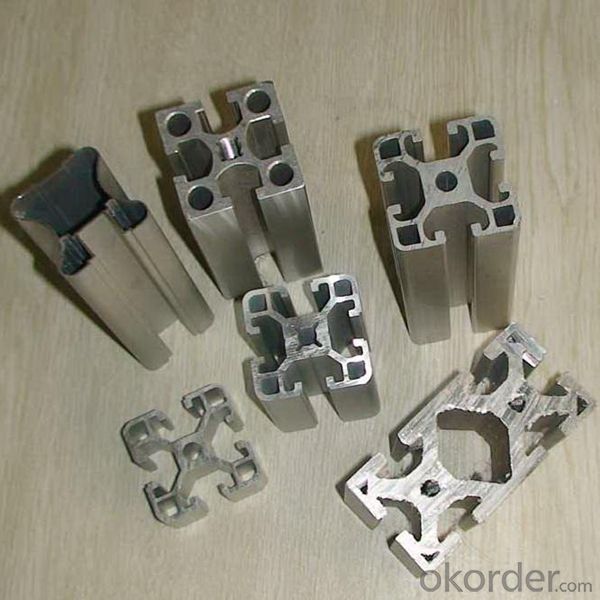
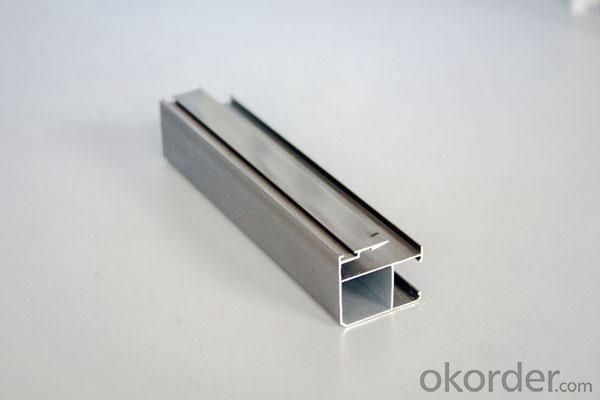
6. Package and shipping of Aluminum Profiles Made in China Alloy 6 Series
First, plastic cloth with drying agent inside; Second, Pearl Wool; Third, wooden cases with dry agent, fumigation wooden pallets, aluminum surface could cover blue PVC film
7. FAQ
Question 1: What is your MOQ?
We accept one ton per type for an order. But the detail we could negotiate.
Question 2: What is your normal terms of payment?
We always trade with you by T/T. But we also accept the L/C as you require.
Question 3: How many kinds of the surface treatment we can choose?
You could choose different color of powder coated. Anodized of black. matte silver, nature, champagne, bronze color. Mill finished. Wooden finished and printed.etc.
Question 4: Can you supply OEM services?
We offer OEM services for 17 years.
Question 5: How many days for opening the mould?
Normally about 10 days.According to the difficulty of your drawing.
Question 6: Can i choose the package what i want?
Yes, of course. We offer various kinds of package.e.g.PE foam. Shrink film. Wrapping paper.
But we would give you professional suggestion of package.
- Q: What are the factors involved in the selection of industrial aluminum profiles?
- Machinability: processability, package, formability, and machinability. Because of the formability and the state, in the selection of aluminum alloy brand, but also need to consider the range of various state of strength, usually the high strength of the material is difficult to shape. The platform should be bent, stretched, deep washed and so on. After finishing, the material has the best formability. On the contrary, the material in the heat treatment state has the worst formability. The cutting of the poor, Aluminum Alloy for molds, machinery parts need cutting better, on the other hand, the low strength of cutting is poor, the mold, machinery parts and other products need cutting, cutting Aluminum Alloy are important factors to consider.Weldability: the weldability of most aluminum alloys is no problem, especially Part 5 series aluminum alloy. It is specially designed for welding consideration. Relatively speaking, it is difficult to weld parts of the 2 and 7 series aluminum alloy.Decorative performance: aluminum used in decoration or some special occasions, need the anodic oxidation of the surface coating processing, to obtain the corresponding color and surface tissue, then the decoration should be a key consideration, in general, good corrosion resistance of the anode material, processing performance, surface treatment coating performance. The performance is very good.
- Q: Can aluminum profiles be used for shopfitting and retail displays?
- Certainly, shopfitting and retail displays can absolutely utilize aluminum profiles. Aluminum, being a versatile material, possesses the advantageous combination of lightweight properties with remarkable strength, making it an ideal choice for constructing structures and fixtures in retail spaces. The customization and fabrication of aluminum profiles are effortlessly achievable, enabling the creation of tailored designs to meet specific requirements, thus allowing for the utmost flexibility in developing diverse display and shopfitting solutions. Moreover, the sleek and contemporary aesthetic offered by aluminum profiles is frequently sought after in retail environments. Furthermore, their exceptional durability and resistance to corrosion guarantee their enduring presence in areas with high foot traffic. Overall, due to their versatility, strength, customization options, and aesthetic appeal, aluminum profiles are an exceptional selection for shopfitting and retail displays.
- Q: This question asks for a comparison of aluminum profiles with other materials regarding their weight and strength characteristics.
- <p>Aluminum profiles are known for their high strength-to-weight ratio, making them lighter than many other materials while maintaining significant strength. Compared to steel, aluminum is approximately one-third the weight but offers comparable strength, especially in alloy forms. When compared to plastics, aluminum profiles have greater rigidity and durability. They also resist corrosion and are more heat resistant than many plastics. However, aluminum profiles are generally more expensive than plastics and some steels. In summary, aluminum profiles offer a balance of low weight and high strength, making them suitable for applications where weight savings and structural integrity are crucial.</p>
- Q: This question asks for a comparison between aluminum profiles and other materials commonly used for roofing, focusing on their characteristics and performance.
- <p>Aluminum profiles for roofing are known for their durability, corrosion resistance, and lightweight nature. Compared to materials like steel, they are less prone to rust and offer a longer lifespan with minimal maintenance. When compared to traditional materials like wood or clay tiles, aluminum profiles are more resistant to weathering and do not rot or warp. They also have a high strength-to-weight ratio, making them ideal for structures that require lighter roofing materials. Additionally, aluminum profiles can be easily recycled, contributing to sustainability efforts. However, they may not offer the same aesthetic appeal as traditional materials and can be more expensive upfront.</p>
- Q: Are aluminum profiles capable of being tailored to fit unique design specifications?
- <p>Yes, aluminum profiles can be customized to meet specific design requirements. This customization includes altering dimensions, surface treatments, and shapes to fit the needs of various applications. Manufacturers can cut, bend, and machine aluminum profiles to precise specifications, allowing for a high degree of flexibility in design and functionality. Customization is often possible through processes like extrusion, which allows for the creation of complex profiles that can be tailored to exacting standards.</p>
- Q: What are the mechanical properties of aluminum profiles?
- The mechanical properties of aluminum profiles are influenced by factors such as alloy composition, heat treatment, and manufacturing processes. Aluminum profiles generally exhibit excellent strength-to-weight ratio, making them lightweight yet strong. They have good corrosion resistance, making them suitable for various applications in different environments. Aluminum profiles also have good formability, allowing them to be easily shaped and fabricated into desired designs. They have high thermal and electrical conductivity, which makes them useful in applications such as heat sinks and electrical conductors. Additionally, aluminum profiles have low density, which contributes to their lightweight nature. Overall, the mechanical properties of aluminum profiles make them versatile and widely used in a range of industries including construction, transportation, and electronics.
- Q: Are aluminum profiles suitable for constructing sustainable buildings?
- <p>Yes, aluminum profiles can be used to create sustainable building designs. They are lightweight, which reduces the energy required for transportation and construction. Aluminum is also highly recyclable, with a low energy consumption rate for recycling, making it an environmentally friendly choice. Furthermore, aluminum profiles offer excellent thermal conductivity, which can be utilized in energy-efficient designs to reduce heating and cooling costs. Their durability and resistance to corrosion contribute to the longevity of buildings, reducing the need for frequent replacements and thus lowering the environmental impact over time.</p>
- Q: Features of aluminum profiles
- Corrosion resistanceThe density of aluminum profile is only 2.7g/cm3, about 1/3 of steel, copper or brass (7.83g/, cm3, 8.93g/, cm3), respectively. Aluminum can show excellent corrosion resistance in most ambient conditions, including air, water (or brine), petrochemical, and many chemical systems nductivityAluminum profile is often chosen because of its excellent electrical conductivity. On the basis of equal weight, the conductivity of aluminum is nearly two times that of copper.
- Q: How do you prevent galling or seizing with aluminum profiles?
- To avoid galling or seizing in aluminum profiles, several steps can be taken: 1. Apply lubricant: Use a suitable lubricant on the contact surfaces of the profiles. This reduces friction and heat, preventing galling or seizing. Be sure to choose a lubricant specifically made for aluminum to avoid any negative reactions. 2. Utilize surface treatments: Implement anodizing or protective coatings on the profiles. These treatments create a barrier between the profiles, minimizing direct metal-to-metal contact and decreasing the likelihood of galling or seizing. 3. Ensure proper design and materials: Make sure the profiles and their mating components have sufficient clearance and a proper fit. Avoid tight tolerances that can cause excessive contact pressure, which increases the risk of galling. Additionally, select materials with compatible hardness and avoid using dissimilar metals that may lead to galvanic corrosion. 4. Keep things clean: Maintain cleanliness by regularly cleaning the profiles and their mating surfaces, removing any dirt, debris, or contaminants. Foreign particles can increase friction and contribute to galling or seizing. 5. Implement regular maintenance: Establish a preventive maintenance program that includes periodic inspection, cleaning, and lubrication of the profiles. This helps identify any issues early on and ensures smooth operation over time. By following these preventive measures, the risk of galling or seizing in aluminum profiles can be minimized, resulting in longer-lasting performance.
- Q: Is it possible to manufacture aluminum profiles in unique shapes or dimensions tailored for particular uses?
- <p>Yes, aluminum profiles can be made into custom shapes or sizes for specific applications. Manufacturers can customize aluminum profiles through various processes such as extrusion, cutting, bending, and machining to meet the unique requirements of different projects. This flexibility allows for the creation of specialized components that can be used in a wide range of industries, including construction, automotive, aerospace, and more.</p>
Send your message to us
80 20 Aluminum Extrusion Profiles Made in China Alloy 6 Series
- Loading Port:
- Shanghai
- Payment Terms:
- TT OR LC
- Min Order Qty:
- 1 m.t.
- Supply Capability:
- 1000 m.t./month
OKorder Service Pledge
OKorder Financial Service
Similar products
Hot products
Hot Searches
Related keywords
